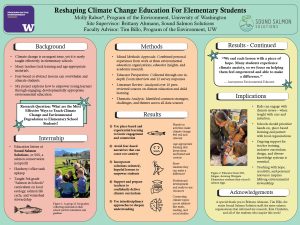Reshaping Climate Change Education for Elementary Students
Many elementary students aren’t being effectively taught about climate change and environmental issues—not because they don’t care, but because traditional education methods often fail to meet them where they are. There is a growing disconnect between the urgency of the climate crisis and how it is introduced to young learners. The aim of this project was to explore how climate change education is currently approached in elementary schools and to identify ways to make it more engaging, accessible, and emotionally resonant. Through my internship with Sound Salmon Solutions, I taught third-grade students about salmon conservation as part of their “Salmon in Schools” program. I gathered data by conducting interviews with environmental educators, reviewing literature on environmental education strategies, and reflecting on my own experiences teaching in outdoor settings. These methods shaped a deeper understanding of how curiosity, movement, and empathy foster student connection to environmental issues. Findings suggest that students connect more deeply with environmental topics when learning feels relevant, when curiosity and movement are encouraged, and when classrooms prioritize empathy alongside information. Hands-on, local, and flexible teaching methods—such as storytelling, sensory experiences, and place-based learning—are especially effective in engaging hesitant learners. This work highlights the need to reshape environmental education to be more inclusive and responsive, especially for students who may not thrive in traditional academic settings. By reimagining how we teach climate change, we can better equip the next generation to care about, and act on, the environmental challenges ahead.
